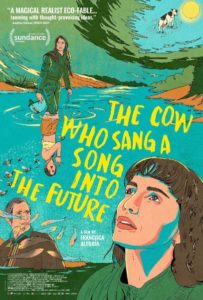 Acclaimed at the Sundance, San Francisco, Seattle, and Frameline film festivals, Kino Lorber, has announced the North American theatrical releases of the poignant and stunning debut feature by Chilean filmmaker Francisca Alegría, The Cow Who Sang a Song Into the Future (La vaca que cantó una canción hacia el futuro).
Acclaimed at the Sundance, San Francisco, Seattle, and Frameline film festivals, Kino Lorber, has announced the North American theatrical releases of the poignant and stunning debut feature by Chilean filmmaker Francisca Alegría, The Cow Who Sang a Song Into the Future (La vaca que cantó una canción hacia el futuro).
The elegiac eco-fable opens on Friday, May 19, at the Quad Cinema in New York City, and on Friday, May 26 at the Landmark Nuart in Los Angeles, followed by other cities across the country.
It begins at a river in the south of Chile where fish are dying due to pollution from a nearby factory. Amid their floating bodies, long-deceased Magdalena bubbles up to the surface gasping for air, bringing with her old wounds and a wave of family secrets. This shocking return sends her widowed husband into turmoil and prompts their daughter Cecilia to return home to the family’s dairy farm with her own children.
Magdalena’s presence reverberates among her family, instigating fits of laughter and despair in equal measure with all but Cecilia’s eldest child, a transgender teenager, who finds much-needed comfort in their grandmother’s love and unconditional understanding during a time of transition.
In The Cow Who Sang a Song Into the Future, a choir of creatures introduces a world delicately constructed by fantasy, mystery, and magical realism. With an impressive ensemble cast starring Mía Maestro (Frida, The Motorcycle Diaries), Leonor Varela (Sleep Dealer, Blade II), Alfredo Castro (Tony Manero, No), and introducing newcomer Enzo Ferrada Rosati, Alegría’s wistful and lyrical debut feature is an ambitious proposal for acceptance, nature, renewal, and healing, suggesting that the dead return when they are most needed.
Expanding on themes from her acclaimed Sundance-winning short film And the Whole Sky Fit in the Dead Cow’s Eye, and touching on prescient subjects such as multi-generational trauma, environmental catastrophe, class, and queerness—while imbuing the narrative in genre elements of supernatural horror and science fiction—Alegría’s impressive feature debut cements her as a filmmaker to watch amid the recent wave of female directors to come out of Chile.
